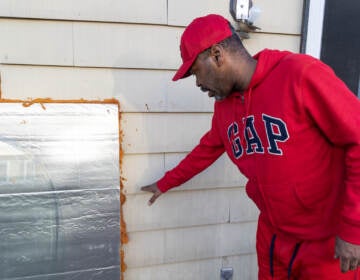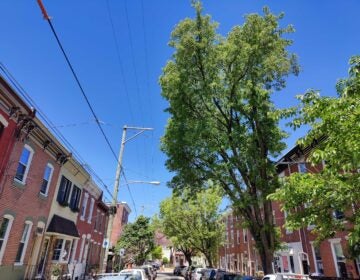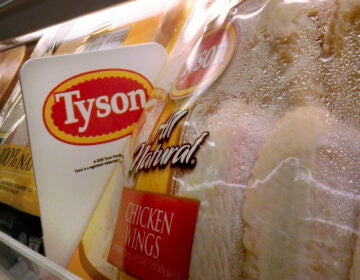Delaware River spill: Philadelphia water safe to drink through Monday evening, officials encourage residents store tap water
Officials say the new timeline is based on how long it will take river water to reach customers after entering a Northeast Philly treatment plant.
Listen 1:28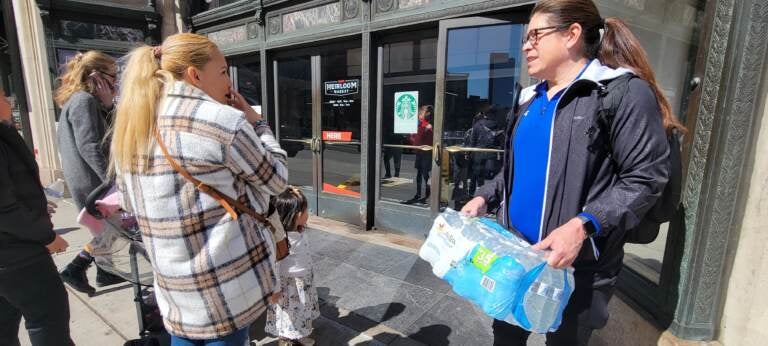
Residents could be seen carrying water through the streets of Philadelphia after the city recommend people start using bottled water starting at 2 p.m. on Sunday. (Cory Sharber/WHYY)
The Philadelphia Water Department is now encouraging residents to store tap water — instead of buying bottled water in stores — after hazardous materials spilled into the Delaware River. The recommendation comes after officials said Sunday afternoon that water in the city will remain safe to drink through Monday evening at 11:59 p.m.
“We advise people that they can drink their tap water. There’s no need to buy water.” Mike Carroll, deputy managing director for the city’s Office of Transportation, Infrastructure and Sustainability said in a virtual news conference Sunday evening. “If they want to store water, they should store water from their tap in a bottle or pitcher and they can stick it in their fridge or refrigerator and it will be fine for them to drink”
It’s the latest in a series of updates after residents were advised just hours earlier to drink bottled water until further notice after an estimated 8,000 gallons of a latex-based solution spilled into Otter Creek from a plant in Bucks County. The plant makes acrylic resins, which are often used in paints to prevent corrosion, and weather-proof manufactured items like cars.
Sunday’s initial advisory instructed residents to drink bottled water after 2 p.m., but officials now say that was said out of an “abundance of caution” and there were no signs of contamination in the Philadelphia water system. Later Sunday afternoon, officials said testing found water from the spill had not made its way into the city’s system.
The messages sparked what could be described as panic buying of bottled and filtered water in the large section of the city impacted by the initial advisory, leaving shelves across Philadelphia empty. But the release from the water department Sunday afternoon said “there was no need to buy water at this time” and advised “customers can fill bottles or pitchers with tap water” to store for future use.
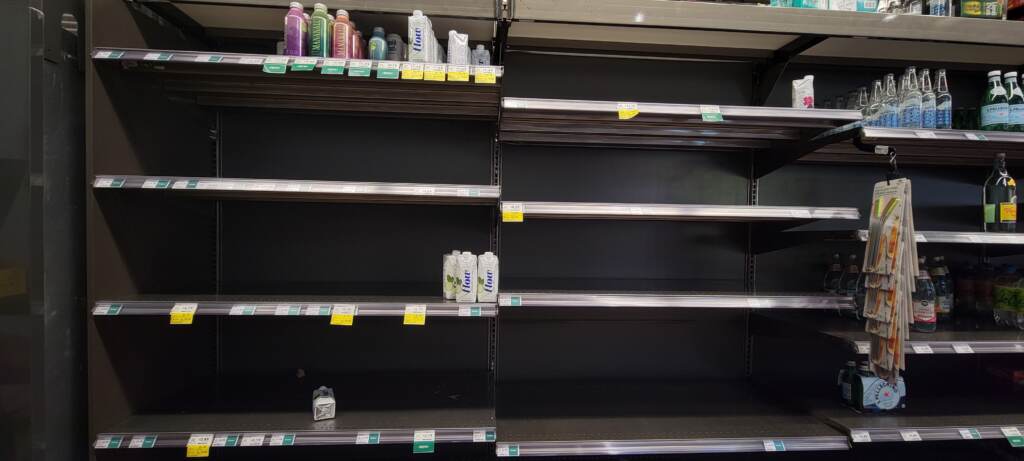
The spill occurred just before midnight on Friday, March 24, according to the Philadelphia Water Department and Office of Emergency Management.
Altuglas, a subsidiary of Trinseo PLC, confirmed to WHYY News a pipe rupture at their plant in Bristol led to a release that spilled the hazardous liquid into a storm sewer that flowed into Otter Creek, a tributary of the Delaware River. The company, which employs 110 people, said no employees were injured.
“We are conducting a thorough assessment of all of our systems and processes to identify and address potential vulnerabilities and will take the steps necessary to close any gaps,” Trinseo CEO Frank Bozich said. “The release of material has been stopped and our efforts are now focused on testing the local waterways.”
The chemicals released into the Delaware River include butyl acrylate, a flammable liquid used to manufacture paints, coatings, caulks, sealants, and adhesives. The same chemical was also released into a river in East Palestine, Ohio as a result of the Norfolk Southern train derailment. Two other chemicals released in the spill include Ethel acrylate and methyl methacrylate, both are used in the manufacture of plastics and coatings like latex paint.
The milky white substance is water soluble. Carroll said flyovers conducted over the weekend by Philadelphia Police and the Pennsylvania Department of Environmental Protection found evidence of a visible spill along the Delaware. He said the heavy rains have helped clear up those plumes.
“What we saw after all the rains yesterday, and with the tidal events over the last day and a half, is that that plume is not in evidence.” he said.
“Our best information is that people who ingest water will not suffer any near-term symptoms or any acute medical conditions,” Carroll said Sunday morning. “We foresee no need to seek medical attention related to this event. There is no concern over skin exposure or fire hazard. Likewise, we have no concern over inhaling any fumes at the levels we’re evaluating.”
The Delaware River is the drinking water source for around 15 million residents of Pennsylvania, New Jersey, and Delaware. The bottled water advisory applies only to residents of Philadelphia who live east of the Schuylkill River. Neighborhoods west of the Schuylkill along with parts of Northwest Philadelphia, draw their drinking water supply from the Schuylkill, not the Delaware.
The water department has released a map showing the potentially impacted areas.
Officials said Saturday that the Baxter Water Treatment Plant in Northeast Philadelphia had been closed following the spill, but water intakes reopened at high tide early Sunday to maintain minimum levels of water in the system. Officials said it was needed to avoid any damage to equipment, and to supply water for essential needs, such as fire safety.
The Philadelphia Water Department plans to reopen the intake again Monday morning in order to maintain minimum water levels. Carroll said it will take “between 24 and 48 hours to work through the system before there’s a chance for it to be at anyone’s tap.”
The city will continue to monitor contamination levels and plans to provide additional updates Monday.
“Our hope is that we can report to people tomorrow at some point in the evening if the concern has fully passed,” Carroll said.
Coast Guard officials have advised the public to stay away from the contamination site as cleanup efforts are underway.
WHYY is your source for fact-based, in-depth journalism and information. As a nonprofit organization, we rely on financial support from readers like you. Please give today.



